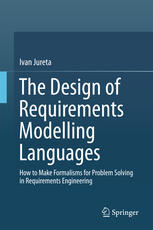

Most ebook files are in PDF format, so you can easily read them using various software such as Foxit Reader or directly on the Google Chrome browser.
Some ebook files are released by publishers in other formats such as .awz, .mobi, .epub, .fb2, etc. You may need to install specific software to read these formats on mobile/PC, such as Calibre.
Please read the tutorial at this link: https://ebookbell.com/faq
We offer FREE conversion to the popular formats you request; however, this may take some time. Therefore, right after payment, please email us, and we will try to provide the service as quickly as possible.
For some exceptional file formats or broken links (if any), please refrain from opening any disputes. Instead, email us first, and we will try to assist within a maximum of 6 hours.
EbookBell Team

4.4
92 reviewsThis book explains in detail how to define requirements modelling languages – formal languages used to solve requirement-related problems in requirements engineering. It moves from simple languages to more complicated ones and uses these languages to illustrate a discussion of major topics in requirements modelling language design.
The book positions requirements problem solving within the framework of broader research on ill-structured problem solving in artificial intelligence and engineering in general. Further, it introduces the reader to many complicated issues in requirements modelling language design, starting from trivial questions and the definition of corresponding simple languages used to answer them, and progressing to increasingly complex issues and languages. In this way the reader is led step by step (and with the help of illustrations) to learn about the many challenges involved in designing modelling languages for requirements engineering.
The book offers the first comprehensive treatment of a major challenge in requirements engineering and business analysis, namely, how to design and define requirements modelling languages. It is intended for researchers and graduate students interested in advanced topics of requirements engineering and formal language design.